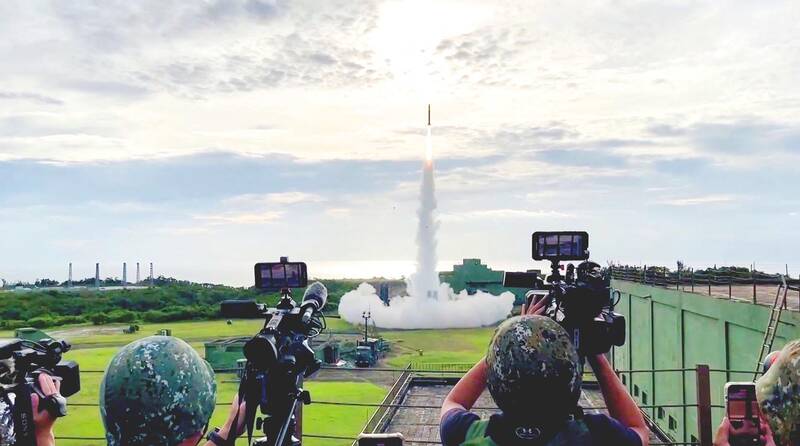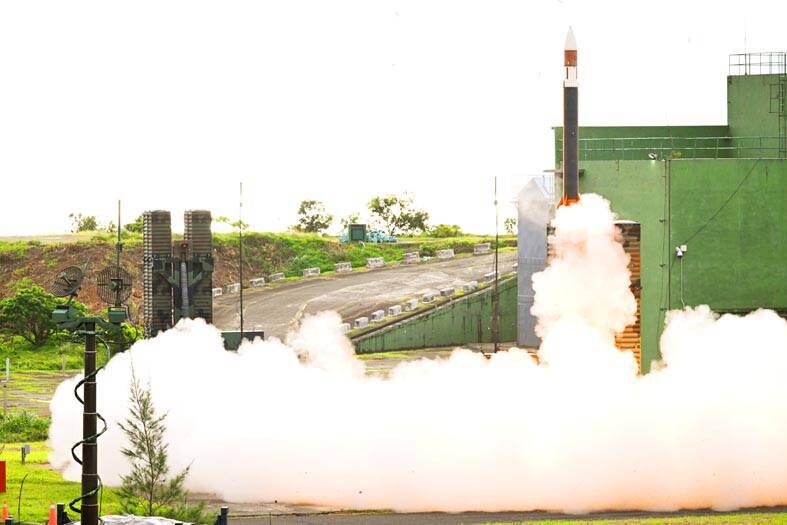The military yesterday demonstrated its precision missile capabilities by firing its indigenous Tien Kung III (Sky Bow III) land-based surface-to-air missile and US-made Patriot PAC-2 surface-to-air missiles in drills open to the media.
The exercises were held in areas around Jiupeng Military Base in Pingtung County’s Manjhou Township (滿州). Two PAC-2 missiles and one Sky Bow III were fired and hit their respective target drones.
Local media speculated that the military also test-launched the expanded version of Hsiung Feng II-E (Brave Wind II-E) from the same site earlier yesterday, but that was not officially open to the media.

Photo: Reuters
The Hsiung Feng II-E is a surface-to-surface land-attack cruise missile system. Its expanded version reportedly has a range of 1,200km, meaning that Chinese inland provinces, for instance, would be within the missile’s reach.
Without confirming nor denying the test launch of the Hsiung Feng II-E, military spokesman Major General Sun Li-fang (孫立方) said that all of the military’s live-fire drills were conducted in accordance with its annual plan.
“Some of the tested missiles are more sensitive, so we will not comment on what kind of missiles were used in such drills,” Sun said.

Photo: Chen Yi-kuan, Taipei Times
“All the missiles that were fired today have smoothly hit their mark and have proven two points — the first being that the training of our soldiers is very solid, the other being that our weapons systems have been verified during this process of firing missiles,” Sun said.
The drill area in Jiupeng Base has for decades been used by the military and its top weapons development unit, the Chungshan Institute of Science and Technology, but the military has seldom made such missile drills public.
The last time precision live-fire missile drills were open to the media at Jiupeng Base was in 2012.
Meanwhile, the Ministry of National Defense early yesterday said that it had spotted five Chinese military jets and 11 ships close to Taiwan’s shores over the previous 24 hours.
One aircraft crossed the median line of the Taiwan Strait, it said.
While its military is dwarfed by China’s, Taiwan has bought high-tech weaponry from the US, revitalized its domestic arms industry and extended the length of mandatory military service from four months to one year.
The US is bound by its own laws to provide Taiwan with the means to defend itself and considers all threats to the nation a matter of great concern.
Additional reporting by AP and Reuters

A magnitude 5.6 earthquake struck off the coast of Yilan County at 12:37pm today, with clear shaking felt across much of northern Taiwan. There were no immediate reports of damage. The epicenter of the quake was 16.9km east-southeast of Yilan County Hall offshore at a depth of 66.8km, Central Weather Administration (CWA) data showed. The maximum intensity registered at a 4 in Yilan County’s Nanao Township (南澳) on Taiwan’s seven-tier scale. Other parts of Yilan, as well as certain areas of Hualien County, Taipei, New Taipei City, Taoyuan, Hsinchu County, Taichung and Miaoli County, recorded intensities of 3. Residents of Yilan County and Taipei received

Taiwan has secured another breakthrough in fruit exports, with jujubes, dragon fruit and lychees approved for shipment to the EU, the Ministry of Agriculture said yesterday. The Animal and Plant Health Inspection Agency on Thursday received formal notification of the approval from the EU, the ministry said, adding that the decision was expected to expand Taiwanese fruit producers’ access to high-end European markets. Taiwan exported 126 tonnes of lychees last year, valued at US$1.48 million, with Japan accounting for 102 tonnes. Other export destinations included New Zealand, Hong Kong, the US and Australia, ministry data showed. Jujube exports totaled 103 tonnes, valued at

TRUST: The KMT said it respected the US’ timing and considerations, and hoped it would continue to honor its commitments to helping Taiwan bolster its defenses and deterrence US President Donald Trump is delaying a multibillion-dollar arms sale to Taiwan to ensure his visit to Beijing is successful, a New York Times report said. The weapons sales package has stalled in the US Department of State, the report said, citing US officials it did not identify. The White House has told agencies not to push forward ahead of Trump’s meeting with Chinese President Xi Jinping (習近平), it said. The two last month held a phone call to discuss trade and geopolitical flashpoints ahead of the summit. Xi raised the Taiwan issue and urged the US to handle arms sales to

BIG SPENDERS: Foreign investors bought the most Taiwan equities since 2005, signaling confidence that an AI boom would continue to benefit chipmakers Taiwan Semiconductor Manufacturing Co’s (TSMC, 台積電) market capitalization swelled to US$2 trillion for the first time following a 4.25 percent rally in its American depositary receipts (ADR) overnight, putting the world’s biggest contract chipmaker sixth on the list of the world’s biggest companies by market capitalization, just behind Amazon.com Inc. The site CompaniesMarketcap.com ranked TSMC ahead of Saudi Aramco and Meta Platforms Inc. The Taiwanese company’s ADRs on Tuesday surged to US$385.75 on the New York Stock Exchange, as strong demand for artificial intelligence (AI) applications led to chip supply constraints and boost revenue growth to record-breaking levels. Each TSMC ADR represents